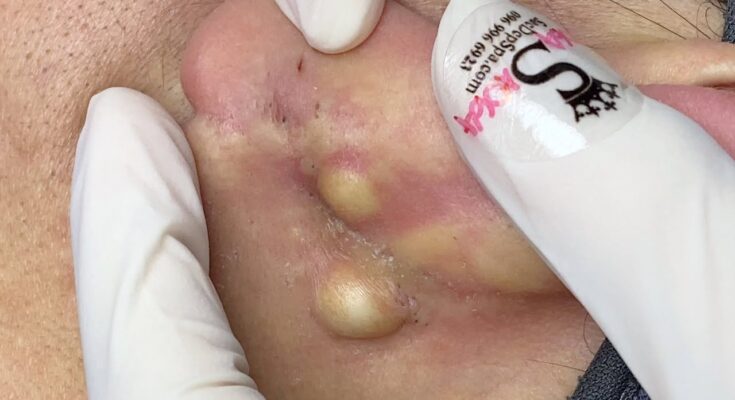Acne on the ear can be particularly uncomfortable and annoying, but there are several ways to protect and treat it. Here’s a guide on how to manage and prevent acne on your ear:
1. Keep the Ear Clean
- Gentle Cleansing: Clean your ears regularly with a mild, non-comedogenic cleanser to prevent oil and dirt buildup, which can contribute to acne. Use a soft washcloth or cotton pad to wipe the outer ear gently. Avoid using harsh scrubbing motions, as the skin on and around the ear is sensitive.
- Avoid Cotton Swabs Inside the Ear Canal: Only clean the outer ear. Inserting cotton swabs can irritate the skin and push dirt further into the ear canal, which can make acne worse or cause infections.
2. Don’t Pick or Squeeze
- Avoid Picking: Squeezing acne can worsen the inflammation, spread bacteria, and increase the risk of scarring. This applies to the ear just as it does to acne on the face.
- Use a Spot Treatment: Instead of picking, apply an over-the-counter acne treatment (such as benzoyl peroxide or salicylic acid) directly to the affected area with a clean cotton swab.
3. Use Non-Comedogenic Hair and Skin Products
- Hair Products: Some hair products (such as gels, pomades, or oils) can clog pores around the ears if they come into contact with the skin. Make sure to use non-comedogenic products to minimize irritation.
- Shampoo and Conditioner: Use gentle, sulfate-free products to avoid irritation. Residue from hair care products can sometimes cause acne if it comes into contact with the skin on your ears.
4. Avoid Tight or Irritating Headgear
- Earphones/Headphones: Tight earphones or headphones can create friction and trap sweat, oil, and bacteria, all of which can lead to acne. If possible, try to avoid wearing them for extended periods, or choose models with soft, breathable ear cushions.
- Hats or Helmets: If you wear a hat, helmet, or anything that presses against your ears, make sure to keep your ear area clean and dry. This will help prevent the accumulation of sweat, oils, and bacteria that can cause breakouts.
5. Moisturize the Area
- Hydration: Keeping your skin hydrated can help prevent dryness and irritation that could worsen acne. Use a lightweight, non-comedogenic moisturizer around the ear if needed. Avoid thick creams or oils that can clog pores.
6. Consider Topical Treatments
- Salicylic Acid or Benzoyl Peroxide: Over-the-counter acne treatments that contain salicylic acid or benzoyl peroxide can be applied to the ear, but apply with care. These ingredients help to reduce inflammation, exfoliate dead skin cells, and kill bacteria that can clog pores.
- Tea Tree Oil: Tea tree oil has antibacterial properties and may help treat mild acne. Dilute it with a carrier oil and apply it to the affected area using a cotton swab.
7. Maintain a Healthy Diet
- Limit Sugary and Fatty Foods: Although diet doesn’t directly cause acne, some foods high in sugar and unhealthy fats can trigger or worsen breakouts. A balanced diet rich in fruits, vegetables, whole grains, and lean proteins may help support healthy skin.
- Drink Plenty of Water: Hydration is key for overall skin health. Drinking enough water can help flush out toxins and prevent excessive oil buildup in the skin.
8. Consult a Dermatologist
- If acne on the ear is persistent or becomes painful, or if it’s causing scarring, consider seeing a dermatologist. They can provide stronger topical treatments or even oral medications if needed.
9. Be Mindful of Stress
- Stress can trigger hormonal fluctuations that may worsen acne. Managing stress through relaxation techniques, exercise, and good sleep hygiene can also help prevent flare-ups.
By following these tips and keeping the ear area clean, hydrated, and protected from irritation, you can help reduce and prevent acne on the ears. If the acne persists or worsens, professional treatment may be necessary.

